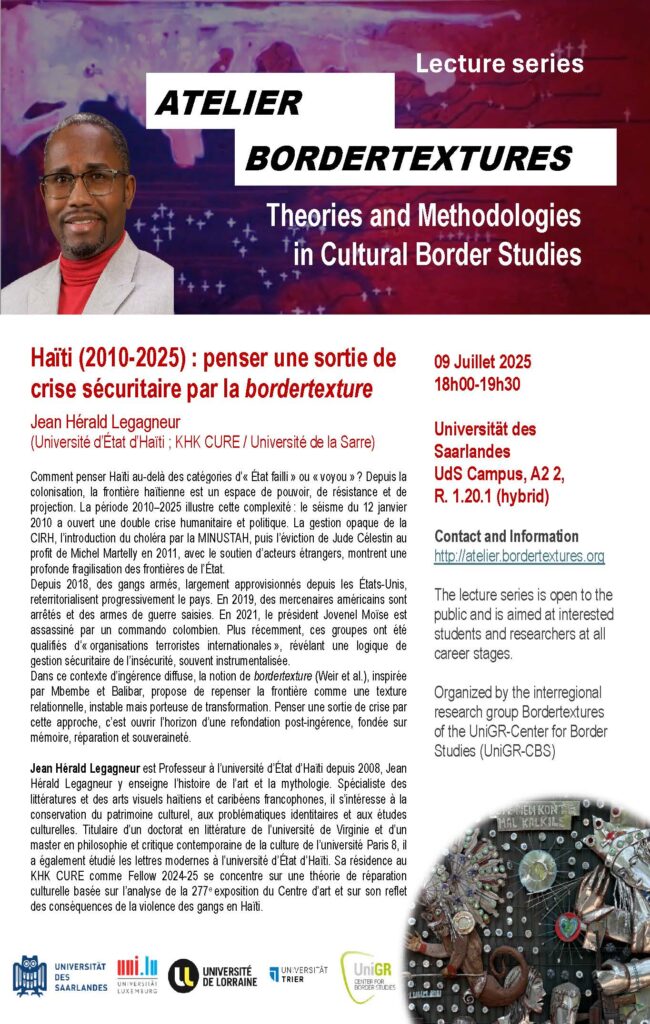Special lecture by Jean-Hérald Legagneur (fellow at the Käte Hamburger Centre CURE)
WHEN
WHERE
Universität des Saarlandes Campus, A2 2, Raum 1.20.1
LANGUAGE
FRENCH
PROGRAM
Jean-Hérald Legagneur (State University of Haiti and fellow at Käte Hamburger Centre CURE) will give a lecture on Wednesday, 9 July 2025 titled: “Haiti (2010–2025): Imagining a way out of the country’s security crisis through bordertexture”. The lecture, held in French, is part of the Atelier Bordertextures series hosted by the Center for Border Studies of the universities of the Greater Region.
How might we approach Haiti beyond the limiting frames of a “failed state” or a “rogue state”? What insights do the intense geosociopolitical tensions reveal about this place – located at the heart of the Caribbean basin and functioning as a strategic crossroads of the Americas? Since colonial times, the island’s western half has served as a geopolitical testing ground. Here, the border functions as a stage of power, a space of resistance, and a site of projection. The years between 2010 and 2025 vividly illustrate these dynamics. The earthquake on 12 January 2010 triggered both a humanitarian and a political crisis. Opaque management of CIRH funds, the cholera outbreak introduced by MINUSTAH (Piarroux, 2019), and the replacement of Jude Célestin in 2011 by Michel Martelly – backed by foreign powers (Peck, 2012) – highlight the fracturing of Haiti’s state borders. Whether symbolic or tangible, these boundaries have been destabilised by actors whose professed aim of stabilising the country often masks conflicting agendas. This underscores the complexity and deep contradictions at play here. In such a context of cynical, performative interference, a conceptual shift becomes essential. The idea of bordertexture (Weier et al., 2021), informed by Achille Mbembe’s necropolitics (2016) and Étienne Balibar’s concept of mobile borders (2001), reimagines the border not as a static line, but as a relational texture. This is a texture that must be redefined across all domains – but especially through literature and the arts, as the works examined in this lecture will illustrate. Three recent developments underscore the urgency of this shift: the 2019 arrest of US mercenaries and seizure of weapons at Port-au-Prince airport; the 2021 assassination of President Jovenel Moïse by a Colombian hit squad; and, since 2018, the gradual takeover of Haitian territory by heavily armed gangs, largely supplied from the US. More recently, Marco Rubio’s designation of these gangs as “international terrorist organisations” seems less a genuine attempt to address insecurity than a move to securitise the crisis – ultimately seeking to exploit or capitalise on the situation. Are we witnessing a new, more diffuse – yet still active – form of imperial or neocolonial interference? And if so, might bordertexture offer a pathway out of crisis – reopening the possibility of a post-interference refounding grounded in memorial justice, institutional reparation, and the recovery of sovereignty?
The Atelier Bordertextures is a public lecture series organised by the Bordertextures working group at the UniGR-Center for Border Studies, where invited speakers explore border-related issues from cultural perspectives, grounding them in their own research.
To attend online, follow this link.
